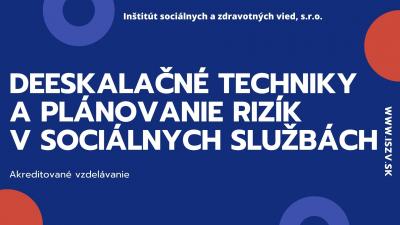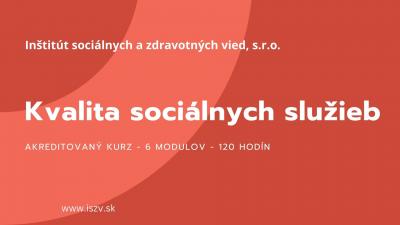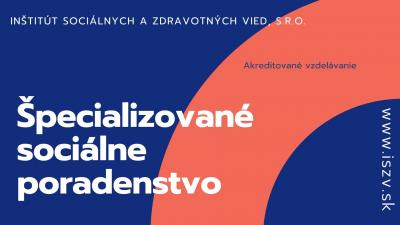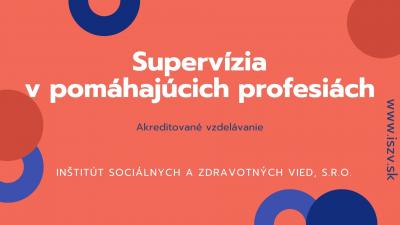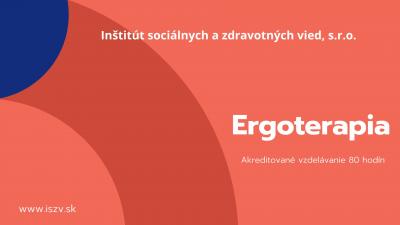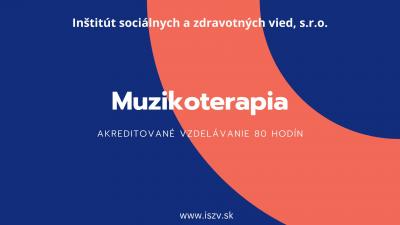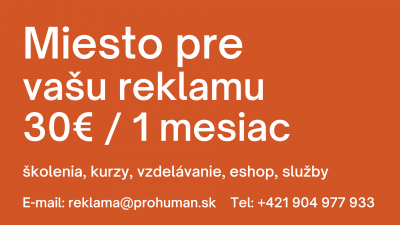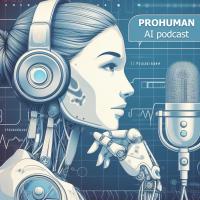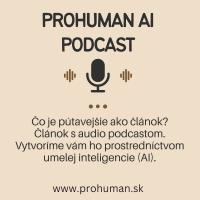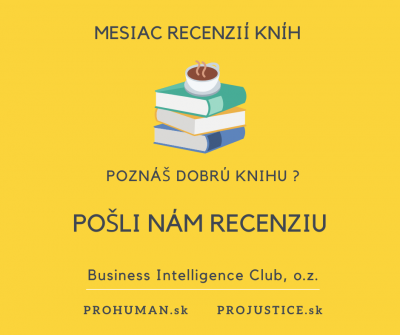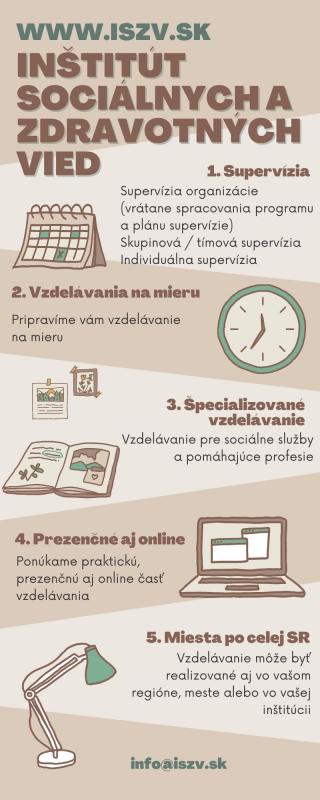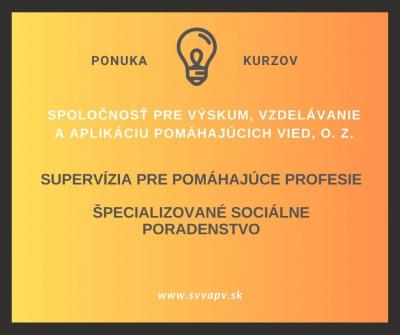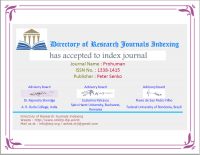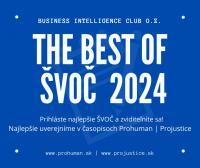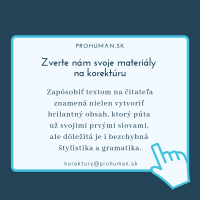Abstract: The paper brings information obtained through the realized Specific Grant Competition of the Palacký University of Olomouc. The research aimed at mapping the possibility of consequent education of adult persons with learning disabilities from the aspect of four groups of respondents (adult persons with learning disabilities, family members, personnel of social services and of employers). The theoretical section of the contribution renders an outline of the current knowledge of these issues. The empirical section presents the attitudes of the respondents – family members -, which were obtained by the investigative method of a semistructured interview.
Keywords: adult persons with learning disabilities, lifelong education, family
1. Introduction to the Problems
The paper was orientated towards the area of special education, concretely towards special educational psychopaedic andragogics. The research investigation aimed at mapping the area of the problems of consequent education of adult persons with learning disabilities in the period of medium and late adulthood. The process of lifelong education, continuous learning, leisure-time activities and activating techniques, which enables meaningful daily occupation or spending of leisure time, falls under the meaning of the term consequent education. The research investigation ran from March to November on the territories of the Moravian-Silesian and Olomouc Regions. All in all we processed the statements of four groups of respondents. This concretely concerned adult persons with learning disabilities, family members and the staff of facilities for the adult clientele and employer personnel. Information from the first group of respondents was gained using the Q-methodology. A semistructured interview was implemented with family members. Questionnaires were distributed among the staff of facilities and employer personnel. In general, the offer of lifelong education, accessible to adult persons with learning disabilities, is only activating centres, evening schools and courses for completion of education. This spectrum is not accessible in all regions of the Czech Republic. We have selected this theme intentionally, in connection with the fact of pressure being exerted on adult persons of the intact population concerning constant complementation of knowledge and enhancement of working competence. In order that a person could match the requirements of the work market, that person must be attractive for his or her potential employer. Our interest lay in whether this trend is provided for in context with persons with learning disabilities. The latter are being educated and prepared for possible working assertion on both the open and protected labour markets. There function many specialized programs and organisations for support in the matter of the initiation process (Program Tranzit, Agency of Supported Employment). Unfortunately, the factual situation demonstrates other criteria. The sphere of lifelong education is thus not sufficiently mapped. Quite often the concept of the process of lifelong education is left to the relevant facilities (institutions) (these are not uniform, they need not be adequate, or systematic). As Černá reports (p. 187, 2008) “Education provides important life fulfilment to individuals, who for various reasons don’t work”. A significant fact is that persons with learning disabilities suffer relatively rapid breakdown of acquired skills. (Vágnerová 2000). This is also accompanied by difficulties in the transfer of skills into practical life. The below-stated statistics show the number of adult persons with learning disabilities in the population of the year 2008:
- within the age range of 30-44 years 9 742 men and 9 564 women,
- within the age range of 45-59 years 12 570 men and 7 732 women,
- within the age range of 60-74 years 8 682 men and 4 645 women,
- within the age range of 75 and over 5 830 men and 13 182 women,
Total 71 947 persons.
At that time there were 8 258 persons living in households, who used no activating or educational media. (Novak; Kalnická, 2008). The above-mentioned statistic was selected intentionally. The information on the number of persons with learning disabilities on the territory of the Czech Republic was collected via GPs, who worked not only in private clinics (outpatients’ departments), but also ensure medical help in public facilities. The statistics were obtained in the year 2007. Every three years new statistics were compiled. The results of the year 2010 are factually processed here. The above-stated numbers quote a large number of persons for which a uniform method of lifelong education is not available. Thus the aim of our research investigation is the creation of groundwork for this methodology.
2. A Family and an Adult Person with Learning Disabilities
A family with a member with learning disabilities has a different social identity and is exceptional in its own way. The lifestyle of the family is different and as a consequence of this there occurs a change of its behaviour not only within the framework of the family, but also in its relationship to wider society. The behaviour of parents, who have an afflicted child, can differ from the norm; they can be disproportionate or accented, while simultaneously these reactions appear only at certain periods or in more demanding life situations. It is necessary to comprehend this as a reaction to complex and longterm strain, which they are compelled to offset. (Vágnerová, 2008).
The incidence of a serious genetic illness or affliction of a child touches in essence the entire wider family in various measures. Not only the parents and siblings are affected, but also the siblings of both parents and their own families, including the grandparents from both the maternal and paternal sides. This family web creates a central focus in which are concentrated the interactions of the closest persons to the child with the affliction or the handicap. (Říčan, Krejčířová, 2006).
A characteristic feature of parenthood is an endeavour to protect the child and it does not change with its age. In families where there is a member with learning disabilities, we often observe, that the worries and protective attitudes of the parents grow with the increasing age of the child. Not all adults are capable of independent volition in various spheres of life and of self-reliance in their fulfilment. Nevertheless, a majority wants to live autonomously, without constant control and supervision of parents. For this reason it is good when the parents of a child with learning disabilities manage to break free, at least to a certain extent, from their concerns, and are able to provide scope for this independent life. (Černá, 2008). Adulthood of a person with learning disabilities requires reorganization of relations, rules and obligations not only in the family, but also in social service facilities, if the person visits such facilities. (Lečbych, 2008). The parents of an adult often consider many questions, which are related concretely to the independence of their afflicted child with learning disabilities. Some of these questions and answers to them, which are concerned, in particular, with lifelong education and assertion at work, are reflected verily in the presented research. According to Černá (2008) this concerns especially the following questions:
- Will he (she) be able to live alone?
- How will he (she) cope with work?
- Will he (she) be able to sustain himself (herself)?
- Will he (she) know how to manage his (her) finances?
- Will anyone misuse his (her) trust?
- How will he (she) manage to reach decisions, when I am not here to counsel him (her),
- What if he (she) should harm himself (herself)?
- Will he (she) lead a partner’s life?
- Who will become his (her) guardian?
It is apparent from the up-to-now processed research data that these very questions are those that parents pose (respondents to our research investigation) very often, and that the answers to individual questions by them differ, and this in dependence on various factors. Lečbych (2008) cites that parents come to terms with the last phase of acceptance of the child’s affliction as an unchangeable fact, not until full maturity of the person with learning disabilities. This contention can in a significant manner complicate the conditions of life in a family and simultaneously those of the persons with learning disabilities. If up to the period of ca 35 years they were considered as children, then it will be difficult for these persons with learning disabilities to fulfil any roles of a mature person. A further risk is the fact that the parent (usually the mother or other female member) becomes a full-time caretaker and does not reflect on further social roles, which then logically peter out over time.
3. Research Investigation
The investigation was carried out on the territory of the Moravian-Silesian and Olomouc Regions. The research sample was composed of four groups of respondents: adult persons with learning disabilities, staff of services whose targeted group are the said persons with learning disabilities, family members of adult persons with learning disabilities, and employers. Adult persons with learning disabilities were ascertained by the research method Q-methodology of what was their relation to educational activities, leisure activities and employment assertion. The individual thesis advanced in Q-methodology represented a set of statements, which were subsequently advanced in the context of the factual skills of the adult person with learning disabilities. The Q-types were subdivided into individual criterial fields, these being, personal criteria, work criteria and motivation criteria. The staff of facilities was first contacted through electronic mail, followed by meetings in person where we staked out mutual requirements, rules and expectations, followed by distribution of questionnaires. We implemented the same procedural system in the collection of data from the employers of persons with learning disabilities. The last group of respondents were family members. The respondents were contacted by us through social services facilities with which the family members cooperate. The attitudes of family members to the education of persons with learning disabilities we ascertained through semistructured interviews. The results of research investigation which we are about to present are statements of the said family members. We chose the category of family members for reason that we started collecting data first of all at this group of respondents as we presumed higher demands in connection with data collection. We also anticipated most complications from the aspect of reciprocal collaboration. More accommodating was the reaction of family members, whose kinsman with learning disabilities lives in a household environment. Also more obliging, than further family members for establishing collaboration, were parents of adult persons with learning disabilities. Our colleague, Hana Joklíková, M.A., participated in the realization of the research investigation.
A semistructured interview took place in an environment selected by the respondents themselves. The course of the investigation was recorded on a Dictaphone. The semistructured interview was selected as a compromise between a structured and unstructured interview. From the structured interview we retained the procedure of posing questions, according to a schematic prepared in advance; however, the respondents had at their choice several variants of answers. At all times we requested from each of them relevant explanations of their answers. (Chráska, 2007). We chose the interview for reason of obtaining a closer relationship with the family member, which Gavora (2000) designates as a rapport. The aim of this step was to gain unaffected and more confidential answers. Utilization of interviews as a research method appeared to be more effective than application of a questionnaire, as we had assumed that during questionnaire investigation the return of the questionnaires would have been very small. We are not aware that such research of this theme has been realized in the conditions of the Czech Republic, and so it is for this reason that the obtained data will create the boundaries for the construction of further research theses. (Gavora, 2000), Janoušek (in Gavora, 2000) cites as a disadvantage of an unstructured interview the great demands laid on the researchers. The methodological demands are associated with the combination of two various forms of interviews. We tried to eliminate this fact by consultations with experts. Semistructured interviews were realized in the Moravian-Silesian and Olomouc Regions. In each region in the period of March to April we performed a pilot investigation, the target of which was to determine a preliminary number of respondents for realistic investigation. In each region we were promised orally collaboration by 30 family members, giving thus a group of 60 respondents. At initiation of the investigation proper, 24 respondents of the Moravian-Silesian Region and 27 respondents of the Olomouc Region confirmed a personal meeting for realization of the interview. In the final result we have processed data of 20 respondents of the Moravian-Silesian Region and 20 respondents of the Olomouc Region. The given final number was lowered for the reason that 1 respondent in the Moravian-Silesian Region, after execution of the interview, refused empirical processing of data and a further respondent refused to answer two questions in the investigation being carried out; for that reason his statement was excluded. In the Olomouc Region 3 respondents did not react to all the questions, so their answers were also excluded.
For each region two schemes of questions were drafted. The first scheme contained questions which were intended for those family members where the member with learning disabilities is actually employed. The second scheme was created for family members where the member with learning disabilities is not employed.
The questions posed to persons whose family member is employed, aimed at the following areas:
- actual employment (type of work, form of work, location of work, contractual period),
- changes of the social role of an adult with learning disabilities,
- motivation of an adult for the work process,
- opinion of the sphere of lifelong education of persons with learning disabilities,
- opinion of the sphere of employment of persons with learning disabilities.
The questions posed to persons whose family member is not employed, concerned the following areas:
- efforts leading to the finding of suitable employment and fear of assertion in the possible work,
- fear concerning the maturity of the person with learning disabilities,
- motivation to find suitable employment,
- opinion of the sphere of education of persons with learning disabilities,
- opinion of the sphere of employment of persons with learning disabilities.
The paper publicizes only some of the answers of the respondents.
 Chart 1: Employment of Family Members in Moravian-Silesian and Olomouc Regions
Chart 1: Employment of Family Members in Moravian-Silesian and Olomouc Regions
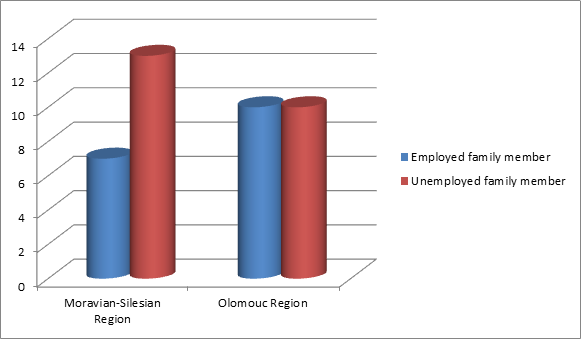 Diagram related to chart 1
Diagram related to chart 1
The following data describe the answers of respondents to questions whether their family member with learning disabilities is employed. In the Moravian-Silesian Region 7 family members are employed and 13 have no employment. In the Olomouc Region 10 family members are employed and 10 are also unemployed. This fact supports the assumption that in the Olomouc Region the offer with regard to education and performance of the working position is more favourable than in the Moravian-Silesian Region.
The reasons which the respondents cited with regard to unemployment of their dependants.
 Chart 2 Specific type of respondent (family relationship view)
Chart 2 Specific type of respondent (family relationship view)
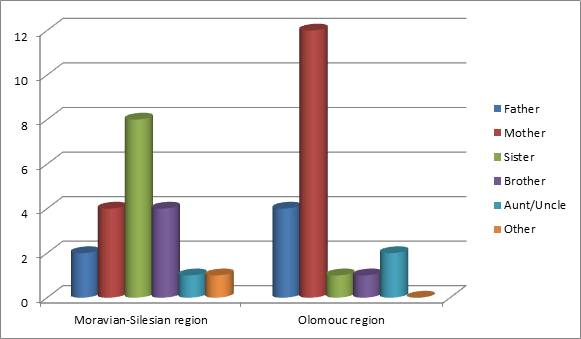 Diagram related to chart 2: Specific type of dependant
Diagram related to chart 2: Specific type of dependant
In the Moravian-Silesian Region, from the aspect of the type of dependant, predominated siblings, i.e. brothers and sisters. We gained most information through the answers of sisters. One respondent fell into the category of “Other”, concretely a sister-in-law. In the Olomouc Region, from the aspect of structure of the respondents, there was an unambiguous predominance of parents (i.e. mother over father). According to our opinion, this phenomenon can be explained by the greater occurrence of offers for adult persons with learning disabilities. Due to this reason the parents have already been active in the individual organisations from previous periods and were thus more inclined to participate in the research investigation.
 Chart 3: Respondents’ Age
Chart 3: Respondents’ Age
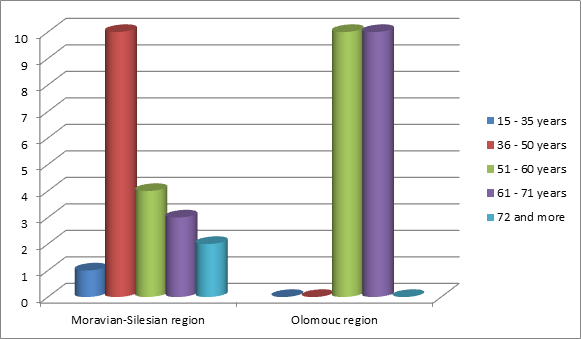 Diagram related to chart 3: Respondents’ Age
Diagram related to chart 3: Respondents’ Age
In the Moravian-Silesian Region the age group 36 – 50 years is predominant. This fact is supported by the realty that the greatest number of respondents was from the ranks of siblings. The age range in the Olomouc Region lies within the extent of 51 – 71 years. This age distribution demonstrates the greatest representation of parents from the aspect of respondents in the group of the stated region.
 Chart 4: Have you ever had the feeling that you are afraid of adulthood of your relative with mental disability?
Chart 4: Have you ever had the feeling that you are afraid of adulthood of your relative with mental disability?
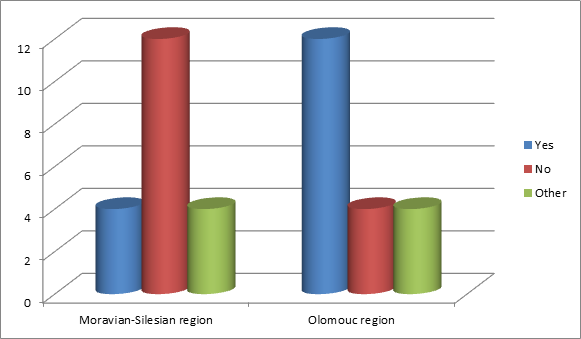 Diagram related to chart 4
Diagram related to chart 4
In the Moravian-Silesian Region there were 12 respondents who were not afraid of adulthood of a family member with mental disability. In this region data were collected mainly through siblings who indicated that they would not take further care of their sibling because they wanted to live their own life. In Olomouc Region there is a forthright predominance of fear of the adulthood of a person with learning disabilities. This fact is explained by the reality that it was primarily the parents (unequivocal preponderance of mothers). Here we quote some answers of the respondents.
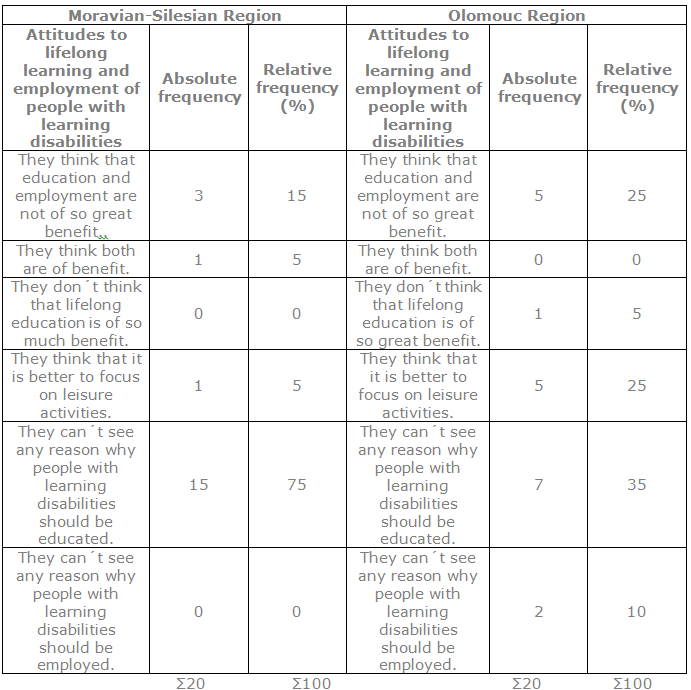 Chart 5: According to your opinion what do other people think in the Czech Republic about lifelong learning and employment of persons with learning disabilities?
Chart 5: According to your opinion what do other people think in the Czech Republic about lifelong learning and employment of persons with learning disabilities?
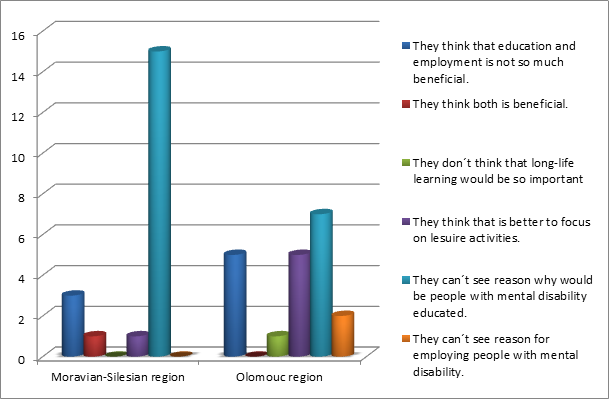 Diagram related to chart 5 Attitudes to lifelong education and employment of persons with learning disability
Diagram related to chart 5 Attitudes to lifelong education and employment of persons with learning disability
In the Moravian-Silesian Region, respondents from the position of family members unequivocally stated that they see no reason why education should be provided to persons with learning disabilities. This variant of the answer is dominant also in the Olomouc Region. In the Moravian-Silesian Region, only one respondent thinks that lifelong education and employment of persons with learning disabilities, is beneficial. This variant was not selected by any family member from the Olomouc Region. Also two respondents from the Olomouc Region see no reason for employing persons with learning disabilities. Altogether six respondents stated (1 from the Moravian-Silesian Region and 5 from the Olomouc Region), that it is necessary to concentrate more on leisure-time activities.
4. Conclusion
The investigation was directed at the sphere of consequent education of adults with learning disabilities in the Moravian-Silesian and Olomouc Regions. This set of problems was reflected from the aspect of family members. The article publicizes only some of the information. Further information will be provided only in the full context of the research investigation. On the basis of the obtained information it can be observed that most siblings at maturity have no interest in supporting a person with learning disabilities and prefer to devote oneself to one’s own family. On the other hand it is the parents who endeavour to bring up their offspring with learning disabilities for time as long as possible. Thus on one hand they support their life in a natural environment, but on the other hand do not motivate the person with learning disabilities to accept the role which concerns adulthood. As far as employment of a person with learning disabilities is concerned, this situation is balanced in the Olomouc Region, where 10 respondents cited, that their family member had employment and also 10 respondents that their family member had no employment. This reality should be comprehended within the context of the relatively broad offer to persons with learning disabilities, which are primarily ensured by non-profit organisations in the Olomouc Region. Fear of adulthood (maturity) of persons with learning disabilities is to be found, first and foremost, in the Olomouc Region. It is due to the reason that the respondents there were primarily parents, for whom this sphere is one of the most pressing problems associated with the process of their aging. In the Moravian-Silesian Region, where the respondents were predominantly siblings, the situation is different; there is no fear of adulthood. The question which concerned attitudes towards lifelong education of adult persons with learning disabilities provided relatively clear results. Family members in both regions do not consider as necessary that persons with learning disabilities should need to be educated. In this context it is necessary to point out that when not even family members support the trend of lifelong education, then positive attitudes cannot be expected of the intact population.
Autor: Mgr. et Mgr. Petra Křížkovská
Ústav speciálněpedagogických studií, Univerzita Palackého v Olomouci
Bibliography
Černá, M. (2008). Česká psychopedie. Praha: Karolinum.
Gavora, P. (2010). Úvod do pedagogického výzkumu. Brno: Paido.
Chráska, M. (2007). Metody pedagogického výzkumu. Praha: Grada.
Lečbych, M. (2008). Mentální retardace v dospívání a mladé dospělosti. Olomouc: UP Olomouc.
Novák, J., Kalnická, V. (2008). Šetření zdravotně postižených osob zaplnilo další bílé místo na mapě české statistiky. Praha: Statistika. Dostupné z http://www.panda.hyperlink.cz/cestatxt/minule.htm
Říčan, P., & Krejčířová, D. (2006) Dětská klinická psychologie. Praha: Grada.
Vágnerová, M. (2008). Psychopatologie pro pomáhající profese. 4. Praha: Portál.
